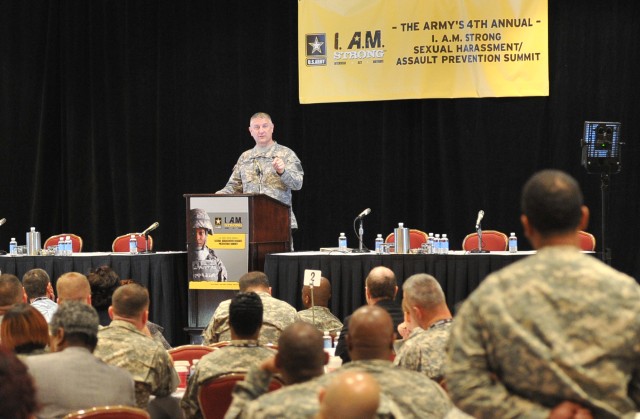WASHINGTON (Army News Service, March 30, 2011) -- Army Chief of Staff Gen. George W. Casey Jr. said the Army needs a cultural change in order to eliminate sexual assault and harassment from its ranks.
Speaking before the fourth Sexual Harassment/Assault Response and Prevention summit titled "Achieving Cultural Change" March 29, Casey asked the audience to ponder just what it was going to take to generate the necessary cultural change.
"I can't believe that a force as good as we are, that's fought together, that's cried together, that's mourned together, that's bled together, that's liberated 50,000,000 people from tyranny in the last decade -- I can't believe that this combat-seasoned band of brothers and sisters can't stop this scourge," he said.
Even though SHARP has come a long way in putting the realities of sexual harassment and the violence of sexual assault to the forefront of leadership at all levels, the perception by and large, according to the chief, is that sexual harassment/assault aren't viewed by Soldiers as Army-wide problems -- it's "not my problem, but somebody else's attitude."
"I agree with the folks in here that we haven't gotten an Army-wide conviction to come out and stop this scourge, so the question is how do we change the culture to get us there -- what is it we need to do' I don't think we've cracked that yet," he said.
"First of all, I think it's going to take sunshine, and by that I mean shining the light on it, talking about it, not sweeping it under the rug," he said. "One of the things I tried to do as chief was to create a culture in the Army that accepted the fact that the only way something is going to get better is if you put some sunshine on it, which means leaders have to talk about it, think about it, talk to their subordinates about it and put it up in front of everybody, top down, bottom up approach."
Sgt. Maj. of the Army Raymond F. Chandler III, who spoke following Casey, agreed that the key to fixing the culture or "atmosphere" will be to continuously engage leadership at all levels. He said noncommissioned officers in particular must reflect on what's happening in their organizations, because NCOs enforce standards and set discipline.
"Do you foster an environment or an atmosphere in your unit to intervene, act and motivate' Are you the consummate professional, always living and upholding the Army values in our warriors' Would you put a stop to sexual harassment or assault if it involved one of your good friends or peers'" he asked the audience.
Chandler said it was up to all leaders to have the courage to not only look down the chain, but to the left, right and up the chain as well, and to be an agent for cultural change in the Army by upholding the Army's value system.
The objective of the five-day summit is to give Army leaders, program managers and coordinators the opportunity to exchange and share strategic guidance and best practices.
The conference kicked off phase three of a four-phased "I. A.M. Strong" campaign to end sexual assault and harassment. Phase four is slated for 2013.
Related Links:
Tri-Signed Letter: Sexual Assault Awareness Month
SHARP opens third phase of I. A.M. Strong campaign
Video: SMA Chandler speaks at 2011 SHARP Summit
Video: CSA Gen. Casey speaks at 2011 SHARP Summit
STAND-TO!: Sexual Harassment/Assault Response and Prevention Program


Social Sharing